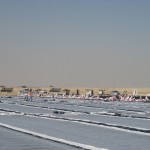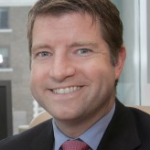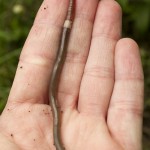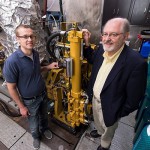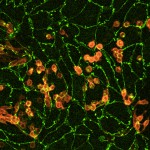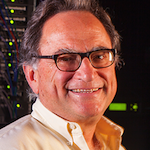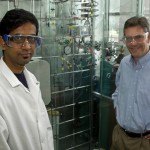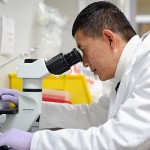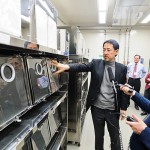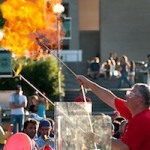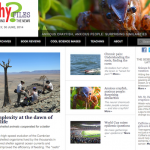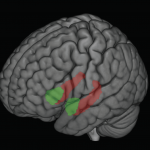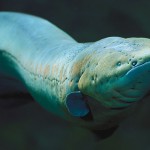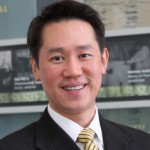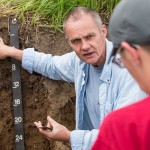Category Science & Technology
UW researchers create safe, resistant material to store waste
Storing industrial waste has never been a pretty job, and it's getting harder.
Hungry, invasive ‘crazy worm’ makes first appearance in Wisconsin
Wisconsin's newest invasive species has done its best to stay underground, but the voracious, numerous and mysterious Asian crazy worm has emerged for the first time in the state on the campus of the University of Wisconsin–Madison.
Best-ever efficiency points to clean, green gas-diesel engine
The one-cylinder test engine in the basement of a University of Wisconsin–Madison lab is connected to a life-support system of pipes, tubes, ducts and cables. You might think that the engine resembles a patient in intensive care, but in this case, the patient is not sick. Instead, the elaborate monitoring system shows that the engine can convert 59.5 percent of the chemical energy in its fuel into motion — significantly better than the 52 percent maximum in modern diesel truck engines.
Wisconsin scientists find genetic recipe to turn stem cells to blood
The ability to reliably and safely make in the laboratory all of the different types of cells in human blood is one key step closer to reality. Writing today (July 14, 2014) in the journal Nature Communications, a group led by University of Wisconsin–Madison stem cell researcher Igor Slukvin reports the discovery of two genetic programs responsible for taking blank-slate stem cells and turning them into both red and the array of white cells that make up human blood.
Aviation offers a way forward in biofuels research
Biofuels researchers are increasingly thinking about how the energy market is changing, which challenges them to balance the basic science of new fuels with a more holistic view of the most commercially viable ways to produce them. So when a group of University of Wisconsin–Madison researchers began looking at how to make jet fuel from biomass, they also strived to create a "techno-economic" framework that would illuminate the entire biofuels field.
Three new studies to take a look at angles related to Wisconsin water
Three new research projects, all based at the University of Wisconsin–Madison, will each take a look at a specific angle related to the state’s water supply and use, including one study specifically studying Madison’s water for the presence and effects of manganese.
Mind the gap: Socioeconomic status may influence understanding of science
When it comes to science, socioeconomic status may widen confidence gaps among the least and most educated groups in society, according to a new study by researchers at the University of Wisconsin–Madison's Science, Media and the Public research group.
UW’s important influenza research conducted safely
The UW–Madison Influenza Research Institute (IRI) has been safely conducting important influenza research since its opening at Research Park in 2008. However, press accounts of the results of recent studies as well as a biosafety incident at the U.S. Centers for Disease Control and Prevention in Atlanta have brought IRI into the news.
Letter in response to 1 July 2014 article by Steve Connor in The Independent
We write in response to The Independent’s science editor, Steve Connor’s article “Exclusive: Controversial US scientist creates deadly new flu strain for pandemic research” (1 July 2014). His article is irresponsible, alarmist, sensational and, in many instances, blatantly false.
UW’s important influenza research conducted safely
The UW–Madison Influenza Research Institute (IRI) has been safely conducting important influenza research since its opening at Research Park in 2008.
UW, Madison schools team up to train mindfulness muscles
Mindfulness practice in the classroom may be one way to help students improve their academic performance, nurture their emotional well-being and bolster their behavior.
‘Science is fun’ offers traditional July Fourth show
Chemist and stage master Bassam Shakhashiri will present “Science and Fireworks: Sights and Sounds for Independence Day,” on the Memorial Union Terrace July 4.
Why Files recognized by school librarians
The Why Files, an online science magazine published by the University of Wisconsin–Madison was honored as one of the Best Websites for Teaching and Learning by the American Association of School Librarians, a division of the American Library Association (ALA).
Early life stress can leave lasting impacts on the brain
For children, stress can go a long way. A little bit provides a platform for learning, adapting and coping. But a lot of it - chronic, toxic stress like poverty, neglect and physical abuse - can have lasting negative impacts.
Scientists find the shocking truth about electric fish
Scientists have found how the electric fish evolved its jolt.
Yeast researcher, Chris Hittinger, named Pew Scholar in Biomedical Sciences
A University of Wisconsin–Madison researcher, well known for his work studying yeast fermentation, has been named a Pew Scholar in the Biomedical Sciences by the Pew Charitable Trusts.
Novel collaboration links pharmaceutical expertise in Wisconsin, Taiwan
In a ceremony in San Diego on Tuesday, June 24, the University of Wisconsin–Madison, a world leader in biomedicine, will sign an agreement to collaborate with the Development Center for Biotechnology (DCB), a Taiwanese biotech non-profit.
Faster, safer method zaps tumors with great success
When Kevin McSweeney was referred to UW Health last year for a tumor in his liver, he had already gone through six rounds of chemotherapy and 13 surgeries over ten years to treat his metastasized cancer.

